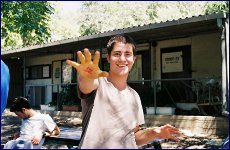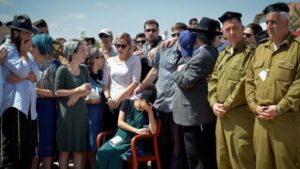 Why does it take tragedy to realize that what unites us is so much greater than that which divides us?
Why does it take tragedy to realize that what unites us is so much greater than that which divides us?
by Shira Levine, Aish. No, I never met this bright, responsible and caring 20-year-old soldier boy that I heard so much about while standing under the glaringly raw Israeli sun at his funeral. But his father requested everyone to attend. So I went.
I went because my heart bled at the tragedy of a young boy just starting out in life being mourned by his parents and nine siblings. I went, because he was merely a child who gave his life for his nation and for his land while on duty. The duty of protecting me, my family and my people.
As I stood there noticing the crowd, I learned something that seemed to shout out at me. A lesson that I never want to forget, yet fear that I will, too quickly.
What an assortment of people stood there. From the sleek secular Israeli businessman, to the disabled man in a wheelchair wearing a large knitted kippa, many young boys and girls, perhaps friends of Shlomo, some very religious looking Rabbis and yeshiva students dressed in their black and white and of course the soldiers, brothers in arms. I wondered what was going through their minds. I wondered what brought each person there. Thousands of them. What connection did they have to Shlomo? What pulled them?
And I realized that you can never tell what someone else has been through. You can never tell what someone else’s experience in this short life is like. How many others there had suffered losses, what challenges to different people face every day? How many are experiencing fear on a day to day basis in these uncertain times we live in? And what emotions are all these people experiencing, feeling the loss and pain of another Jew, feeling compassion and love for someone they don’t know, perhaps feeling fear and a yearning for better days…
How great this nation is, this people who have seen so much horror, who unite together to share in each other’s pain.
And how dare we ever judge another person, have the audacity to think what someone else is going through or decide what another person is like based on his exterior.
Why is it that we sometimes decide we are better than the next person? That we know better? That we are more important than the next person? Why do different beliefs tend to divide us?
Someone who is less religious than I , someone who is more religious than I, too religious, how can we possibly know the worth of another human being?
 There was a shared language there that day. No matter what the level of religiousness or what their background or nationality was, we stood there understanding the language of loss and grief, of God in heaven, a greater Being above us who is coordinating what goes on here down below.
There was a shared language there that day. No matter what the level of religiousness or what their background or nationality was, we stood there understanding the language of loss and grief, of God in heaven, a greater Being above us who is coordinating what goes on here down below.
When we heard the words of Rabbi Rindenow, the heart rendering Kaddish, the courageous and pious acceptance that we don’t always fathom God’s ways, but that He knows what He’s doing as dark as things may seem to us, there was no soul there untouched. There was no one who didn’t feel at least to a small extent that grating, horrific pain of what the family must be going through.
And as we heard Shlomo’s brothers describing the wonderful person who he was, there were many tears on strangers’ faces shed.
The words of his brother Nachum very much echoed what I was feeling. He spoke about how we can never judge another person from the outside, how they are a family that accepts everyone for who they are. And he spoke about how this wasn’t only about their personal pain but about the pain of the entire nation. What greatness! What a people that can see beyond themselves. That sees all Jews as brothers.
As the crowds dispersed, going back to their private lives, I think we all took this feeling of unity with us. We felt just a little bit closer to each other, just a little bit more connected to a greater whole.
We Jews are one family.
We stood there as brothers and sisters, as one.
Why does it seem to take tragedy for us to realize that what unites us is so much greater than that which divides us?
And perhaps when we learn this lesson, when we truly internalize it, we will no longer need to go through such tragedies. I pray that that day will come soon. Because there is only so much one family can bear.

Well said.
Well said, Shlomo was a wonderful student, protecting classmates from bullies, yet allowing himself to be bothered by peers cuz “it’s ok.”
Yehi zichro baruch
Very well said. We are all brothers and sisters and when one gets hurt we all should feel that pain. When one needs help, no mater the background we all should help.
That being said, and not pertaining to this specific story. I must say the following due to the fact that Shira painted with a very large brush what one must do and feel. That we must be united.
The Satmar Rebbi disagrees. At the same time he would weep anytime he heard that any Jew was hurt no matter the background. King David disagrees. Read Psalms 109. Feeling the pain of every Jew doesn’t mean we should also be friends have our children hang out or daven in the same Shul. The Jewish tribes are not even supposed to marry one another. They are supposed to marry with their tribe. That doesn’t mean that they didn’t care for one another. There is just more at stake then “let’s all be excepting of each other and live together in bliss”.